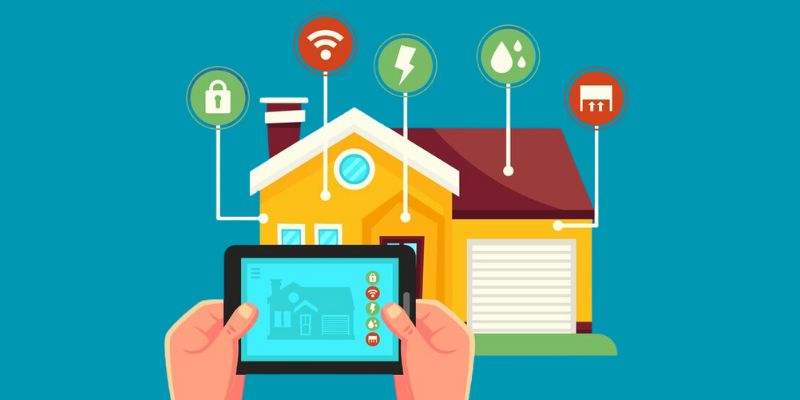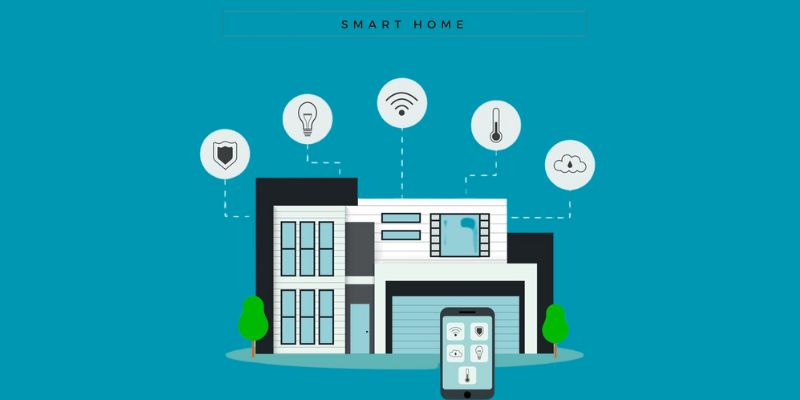Modern homes are becoming more intelligent every day. Imagine having your very own remote control! Thanks to smart home applications, that dream has now come true. Smart home wizards allow users to remotely manage temperature, light settings, security measures, and entertainment through smartphones or tablets.
Smart home apps utilize an IoT app development technology that connects all devices. Hence, they work cohesively to reduce energy usage, increase security, and make homes appear more relaxed. By harnessing IoT capabilities, smart home applications can simplify everyday living by helping reduce consumption while making life safer overall. IoT App Development Services also simplify using these apps so users can take advantage of reduced energy usage, more secure dwellings, and increased home aesthetic appeal.
Have you tried an IoT smart home device, like Google Home or Amazon Alexa, to remotely manage your home appliances? No longer is physical presence necessary when switching on lighting or electronic devices in the house. With just a few taps of an app on a phone screen, you have complete control of all of them. This is a truly transformative power that IoT app development technology possesses!
Smart living and smart homes are becoming increasingly prevalent concepts. People seek feature-packed apps that automate and digitize daily activities, with IoT apps now becoming mainstream. Smart home app development presents several unique development opportunities—many people now desire one! Indeed, some experts predict that by 2027, the global smart homes market could surpass $222.90 billion.
Smart home devices were created with one main goal: making life simpler for their users. Their user-friendliness makes smart home technologies accessible even for non-technology specialists, acting much like having your butler manage all your needs.
Also Read: Create an IoT App from Scratch
What Is a Smart Home App & How Does It Work?
Smart Home App is an IoT-based mobile app or software. It's designed to manage and monitor the various smart and IoT devices within the home using a central platform. The apps generally interact with Internet of Things (IoT) gadgets, home automation systems, and other connected appliances. The main objective of a smart home app is to provide its users with an easy and efficient means of controlling and monitoring various aspects of their house surroundings. Apps for smart homes help create an intelligent home in which technology can improve convenience, energy efficiency, and general home management.
Smart home automation can be described as a brain in your home. Think of this mind as the hub, a centralized control center communicating with smart devices. These could be devices such as thermostats (that regulate the temperature), lighting, thermostats, and cameras. What's more? You can instruct them on what you want them to do with the phone or even use your voice! It's like magic.
For instance, you would like the lights turned off after leaving the house. It's no issue! It's as easy as setting the hub up on your smartphone to start it automatically. This is the best part: it can converse with virtual assistants. If you want to make your house more intelligent, have these smart assistants help with your needs.
Why do we bother with all this intelligent technology? It's because automated homes make life more enjoyable. You'll feel like you've got the personal butler of your home. It's super easy and saves you energy (which can benefit the environment and your wallet) while making your home more secure. It's as if you have a superhero to help you each day.
Read About: Complete Guide of IoT in Mobile App Development
Benefits Of Smart Home Automation Apps
IoT App Development Solutions provide numerous advantages. From maximizing home management to increasing security and automating repetitive chores, smart home applications offer users various options. These are the main advantages of home automation applications.
High Convenience
It is among the most significant benefits of using smart home applications. They allow users to manage and remotely control smart home appliances wherever they are with access to the Internet. Integrating a voice assistant feature or other voice-activated devices into IoT-related apps and offering hands-free controls is possible. This means that smart home automation utilizing IoT applications offers a sense of use and flexibility in the home.
Better Energy Efficiency
Various smart devices, such as intelligent thermostats, smart lights, and so on, are on the market. They all come with an intelligent feature that makes energy use more efficient. IoT applications for home automation allow users to create plans, modify temperature remotely, and optimize cooling and heating. The users can set up lighting routines that automate and turn off the lights if they are unnecessary and alter their brightness. This helps conserve energy.
Robust Security And Safety
Security is a significant and severe issue in houses. With the rise of urbanization and the property market growing and accelerating, the requirement to ensure a safe home is becoming a significant concern. With this in mind, intelligent home mobile applications can assist those who live there in a protected, safer, and secure environment. IoT-based mobile apps allow access to surveillance cameras and sensors. Additionally, you can receive immediate alerts of unusual activity or security breaches.
Home Automation
The home automation feature is the most critical aspect of a smart home. It is a feature that empowers homeowners to take on routine tasks with the ability to automate. With IoT applications for home automation, it is possible to create custom automatization routines that reflect your own preferences and reduce tedious activities. It is possible to set customized scenes that several devices can activate simultaneously.
Peace Of Mind
People who live in traditional homes typically have to be concerned about various issues related to their houses. With the rise of IoT app development technology and the digital revolution, living standards have changed. Nowadays, thanks to the use of smart home automation applications, users can remotely control their homes while on the move.
You can get alerts and view feeds from security cameras online about any activity in the home. These apps provide alerts for certain incidents, such as smoke detection and water leaks, for home security. They will give you peace of mind while you're away from home.
Reduced Time And Effort
This is among the main benefits of IoT Smart Home. As it permits you to automate the smart home system, it reduces time and energy through home automation applications that automate everyday activities. This can save you significant energy and time needed to perform everyday tasks like changing the thermostat's settings, shutting off the lights, and managing security for your home.
Must Read: Top Tools and Platforms for IoT Development by Developers
Key Features Of a Smart Home App

Smart home automation applications typically offer a variety of features that enable users to control various aspects of their residences remotely. These are the most common apps for smart home automation that you'll want to have:
Device Control
Imagine having one remote to control everything in your home. This is what device control can do. It allows you to use the app to oversee all the smart devices in your home, including bulbs, thermostats and cameras, locks, and kitchen appliances. It's like being the captain of your bright vessel.
Voice Control
Do you want to call your home and let it perform your tasks? If you can use voice controls, you can! Chatting using voice assistants such as Siri, Google Assistant, or Alexa can inform your devices what they should do. This is like a chat with your home—a conversation with your house.
Integration With Third-Party Devices And Services
This feature lets you automate and control devices across various brands and platforms. It is compatible with and integrated into various smart home platforms and gadgets.
Schedule Timers
Do you want your lights to switch in and out automatically, just like magic? It is possible to set up timers and timers through your application. It's similar to owning a timekeeper at your house. The lights turn on at sunset and shut off when you go to bed and all that without having to lift a finger.
Remote Access
Did you ever leave your home and were worried you did not switch off the lighting? Your smartphone can monitor and manage your home from any location by using remote access. This is like having the ability to control the house within your pockets, meaning you'll be able to ensure that your home is in the order you'd like, even when you're not in the house.
Push Notifications
Smart home apps can send messages! These are not text messages but rather notifications via push. The app will notify you when something significant happens, such as a motion is discovered, the door opens, or the alarm sounds. It's similar to a home security surveillance system.
Data Analytics And Insights
Imagine your home being able to reveal things such as how much power it's using or what time of the day you use your devices most. This is what data analysis and insight do. They provide information about your gadgets, energy usage, and suggestions on improving your experience. You'll feel like you have an individual data scientist at your house.
Read Also: Security Challenges in IoT Software Development and Possible Solutions
IoT Smart Home App Development Process 2024
The process of developing an IoT Smart Home Application is sequential. It involves planning, designing, developing, testing, and then deployment. Everything must be designed and specified in detail. The development process is more difficult in the case of IoT in modern-day applications that incorporate AI and ML.
However, it's vital to remember that particular steps or technologies could differ depending on the project's requirements, such as the budget, features, technology stacks, etc. So, in this section, we will walk you through the steps to creating an IoT smart home application.
Define Goals And Requirements
First, you must establish the primary goals of your app for smart homes and the specifications. Be sure to know your target user, device compatibility, and critical functions you would like to integrate into your app for smart homes.
To do this, undertake market research to learn about the current competition, users' preferences, and the latest patterns in the smart home world. Discover opportunities for differentiation to distinguish your application from other intelligent home automation applications.
Determine The Unique Features
IoT Smart Home is currently a popular and developing concept in the field. Numerous applications for smart homes in the marketplace are running excellently. If you want to create a smart-home app, you need to decide what your app will do to be different from the competition. What characteristics will the application offer the users, and how will it draw the attention of these users? To distinguish your app from the market, select innovative or well-known elements that empower the users.
Choose Tech Stack For IoT Smart Home App Development
It is among the main components of the IoT app development process. Smart home applications require the integration of a variety of technologies and capabilities. So, it is essential to determine the technology stack you require based on your project's or business ambitions. When your project has particular requirements, it is possible to employ specialists for mobile apps.
Therefore, choose the right technology and frameworks to develop your IoT App development projects based on your preferred platform (iOS, Android, or cross-platform). Considering these programs, databases, and development tools suitable for developing smart home applications is possible.
Design The User Interface (UI/UX)
The smart home application can be utilized for single or multiple purposes. Therefore, the IoT app development creator or developer must design an appropriate UI/UX layout. You must ensure that the user interface for your app to control home automation is easy to use and provides an intuitive navigation experience.
Focus on simple, effortless navigation and appealing visuals. Use a responsive layout with different screen sizes. To guarantee a high-quality start, create wireframes and ensure they meet the specifications.
Integration Of IoT Devices
This is one of the critical steps in developing smart home apps for IoT. To allow your application to operate with remote-controlled control features, your IoT App Developers must integrate your app with different automation home IoT gadgets and protocols. It is essential to ensure that the app works with popular smart home platforms and establishes seamless connectivity between your app and the connected devices.
Implement Automation And Control Features
Make features that allow you to create automated routines, sequences, and rules. Users can control their own devices as well as create custom automaton sequences according to the preferences of their users. Ensure that security is put first through security measures such as encryption, authentication, and authorization.
Finalize And Deploy
You can prepare the application for release when tests and refinements are completed. Upload the app to the appropriate app stores, such as Google Play Store and Apple App Store, or distribute it via other distribution channels. Before releasing, ensure bugs or technical issues do not contaminate the app.
Once you have launched the app, be sure to monitor its performance and adjust it according to user feedback. You could look for a dedicated mobile app development company to ensure your app is updated according to changing market demands.
Also Read: Factors To Investing in IoT Applications Development
Factors That Affect The Cost Of Building a Smart Home App

If you're looking to develop an app for smart home automation, knowing how the costs will be affected is essential. Numerous variables influence the cost of producing a smart home IoT mobile app.
Complexity Of Features
What kind of fancy do you want your app to look like? The more elaborate and sophisticated the functions, such as speaking to your app via voice or tracking exactly where you are (geolocation), the higher you'll pay. The cost might not be so expensive if you're comfortable working with the basic things like switching items off and on.
Platforms And Devices
Consider whether you need the app to run on iOS, Android, or both phones. Also, if you'd like the app to connect to various devices in your house, such as bulbs, thermostats, or locks, this could increase the cost.
App Designing
How user-friendly and attractive are you hoping your app looks and feels? Achieving it to look and feel appealing could increase the cost if you're in the market for exciting images, advanced graphics, or even a distinctive style, which can increase costs.
Connecting To Gadgets As Well As Other Apps
This can prove difficult if your application is compatible with specific devices in your home. It may require greater time and energy to get everything to work. If you wish for your application to be compatible with other services or apps, this can impact costs.
Keeping Things Safe And Private
Smart homes can handle sensitive data, keeping it extremely secure. If the app you are developing requires extra security and adheres to strict privacy regulations, this could increase its cost.
App Development Location And Experience
It is also contingent on where the IoT App Development Company resides and their proficiency level in their field. Some areas have higher living prices, so developers may charge higher prices. Also, if developers are highly experienced, they may charge higher as well.
When you add up the above factors, the expense of developing an app for smart home automation could range from $20k to $50,000 or higher. It all depends on the features you would like your app to achieve and the level of complexity.
Read About: IoT App Development: Step-by-Step Guide - 2024
Challenges Faced In Smart Home IoT App Development
Although developing a smart home application can be extremely enjoyable, it has many challenges. We'll look at some obstacles you may encounter during the process of developing:
Security And Privacy
The most pressing issue when developing smart home apps is security. They handle users' sensitive information and control physical devices, so ensuring that security measures are solid is essential. Security measures to protect the user's privacy and prevent unauthorized access to data and security breaches are a continuous problem.
Device Compatibility
The field of smart home appliances is huge and diversified. Many technologies and brands are available, which makes it difficult to ensure that your application can be used with every one of them. Extra effort is required to guarantee effortless integration across gadgets.
Interoperability And Connectivity
Smart home applications must be able to communicate with various devices, usually using multiple communication methods. Ensuring your application seamlessly connects to and operates with different technologies and platforms can be extremely difficult. It's like trying to learn and speak multiple languages.
Performance Optimization
Monitoring the performance of a home application can be a challenge, mainly when dealing with many devices and data streams. The focus should be on enhancing response time, efficiently utilizing resources, and planning for the future of scalability. This is akin to juggling many tasks and ensuring the system runs efficiently.
Conclusion
When you develop a smart home automation application, your users can access a world of comfort, control, and ease of use. The IoT smart home application is innovative and well-suited for the future IoT application concept. Users can effortlessly benefit from the latest technologies. Because the IoT market is growing, demand for intelligent home applications with distinctive features is expected to rise.
The process of developing an IoT-enabled smart home application is the most complex and demanding. It requires a great deal of knowledge and a clearly defined procedure. So, getting expert assistance from a skilled company that offers expert IoT app development is recommended.













Share this blog